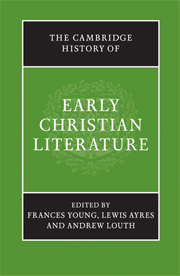Book contents
- Frontmatter
- PART ONE The Beginnings: The New Testament to Irenaeus
- PART TWO THE THIRD CENTURY
- PART THREE FOUNDATION OF A NEW CULTURE: FROM DIOCLETIAN TO CYRIL
- A LITERARY GUIDE
- 21 Classical genres in Christian guise; Christian genres in classical guise
- 22 Arnobius and Lactantius
- 23 Eusebius and the birth of church history
- 24 The fourth-century Alexandrians: Athanasius and Didymus
- 25 Palestine: Cyril of Jerusalem and Epiphanius
- 26 The Cappadocians
- 27 Fourth-century Latin writers: Hilary, Victorinus, Ambrosiaster, Ambrose
- 28 Jerome and Rufinus
- 29 Augustine
- 30 John Chrysostom and the Antiochene School to Theodoret of Cyrrhus
- 31 Cyril of Alexandria
- 32 Hagiography
- 33 Ephrem and the Syriac Tradition
- 34 The literature of the monastic movement
- 35 Women and words: texts by and about women
- 36 Conciliar records and canons
- B CONTEXT AND INTERPRETATION
- Bibliographies
- Index
- Map: The Roman Empire in the late fourth century AD"
- References
36 - Conciliar records and canons
from A - LITERARY GUIDE
Published online by Cambridge University Press: 28 March 2008
- Frontmatter
- PART ONE The Beginnings: The New Testament to Irenaeus
- PART TWO THE THIRD CENTURY
- PART THREE FOUNDATION OF A NEW CULTURE: FROM DIOCLETIAN TO CYRIL
- A LITERARY GUIDE
- 21 Classical genres in Christian guise; Christian genres in classical guise
- 22 Arnobius and Lactantius
- 23 Eusebius and the birth of church history
- 24 The fourth-century Alexandrians: Athanasius and Didymus
- 25 Palestine: Cyril of Jerusalem and Epiphanius
- 26 The Cappadocians
- 27 Fourth-century Latin writers: Hilary, Victorinus, Ambrosiaster, Ambrose
- 28 Jerome and Rufinus
- 29 Augustine
- 30 John Chrysostom and the Antiochene School to Theodoret of Cyrrhus
- 31 Cyril of Alexandria
- 32 Hagiography
- 33 Ephrem and the Syriac Tradition
- 34 The literature of the monastic movement
- 35 Women and words: texts by and about women
- 36 Conciliar records and canons
- B CONTEXT AND INTERPRETATION
- Bibliographies
- Index
- Map: The Roman Empire in the late fourth century AD"
- References
Summary
The first major issue faced by the early Church, that of the terms under which Gentiles could become Christians, was settled, according to the Acts of the Apostles, by a council of the apostles held at Jerusalem. This decided that Gentiles could become Christians, without becoming Jews, subject to renunciation of idolatry and sexual immorality, and certain dietary laws, about which we hear remarkably little in later Church history (see Acts 15:1–21). A very different picture of this dispute is derived from the epistles of St Paul, which make no mention of a council (nor of any dietary regulations), but sees the opening of the Church to the Gentiles as bound up with the authenticity of Paul’s apostolic authority (see especially Gal. 2). Here we see two ways of reaching decisions in primitive Christianity – the council and the authority of the individual apostle (the latter of which can be amply illustrated from elsewhere in the New Testament) – both of which ground the authority for any decision in apostolicity.
Both these models of authority can be found in the later history of the Church – indeed, the tension between apostolic authority as conciliar and authority as exercised by an apostolic individual underlies the most fundamental division in later Christendom – but for our period there is little attempt to erase either pole of this tension. By the second century the basic institutional unit of the Church was the Christian congregation of a city and its hinter-land (the chora) led by a single bishop, who exercised apostolic authority over that community (this is one of the principal themes of the letters of Ignatius of Antioch).
- Type
- Chapter
- Information
- The Cambridge History of Early Christian Literature , pp. 391 - 396Publisher: Cambridge University PressPrint publication year: 2004
References
- 3
- Cited by

